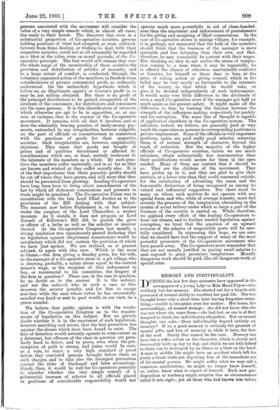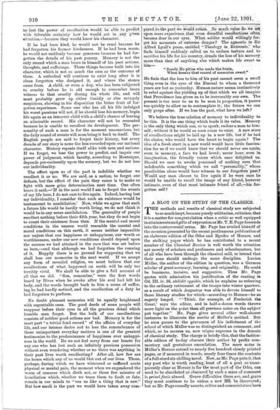MEMORY AND INDIVIDUALITY. D URING the last few days accounts have
appeared in the newspapers of a young lady—a Miss Maud Pryce—who suddenly lost her memory. She started out for a bicycle ride possessed of normal ability to recollect her past life. She was brought home only a short time later having forgotten every- thing,—unable to recognise even her mother. Her home, her surroundings, all seemed strange ; she did not know who she was nor where she came from,—she had lost, as one is at first tempted to think, her individuality altogether. But on second thoughts one asks,—Does individuality depend entirely on memory? If so, a good memory is certainly the greatest of mental gifts, and loss of memory is, while it lasts, the loss of the soul. Surely this cannot be the case. Memory can have but a reflex action on the character, which is slowly and irrevocably built up day by day, and which we are loth indeed to think can be destroyed by an illness or a blow on the head. A man in middle life might have an accident which left his youth a blank while not depriving him of the immediate use of his mental powers. He might suffer what we may call a conscious annihilation ; he might no longer know himself, or, rather, know what to expect of himself. Each new pre- disposition or tendency might surprise him as circumstances called it into sight; yet all those who had known him before
he lost the power of recollection would, be able to predict with tolerable certainty how he would act in any given situation,—because they would. know his character.
If he bad been kind, he would not be cruel becauee. he had forgotten his former kindnesses. If he had been mean, he would not suddenly become generous because he had for- gotten the details of his past penury. Memory is not the only record which a man bears in himself of his past actions, thoughts, and sufferings. These things become built into his character, which is not so much the sum as the outcome of them. A cathedral will continue to exist long after it is clean forgotten who designed it, and where the stones came from. A, child, or even a dog, who has been subjected to cruelty before he is old enough to remember bears witness to that cruelty during his whole life, and will most probably grow up either timidly or else savagely auspicious, showing in his disposition the bitter fruit of for- gotten experience. Some one who has all his life indulged his worst passions will not, if he should lose his memory, begin life again as an innocent child with a child's chance of leaving an admirable record. His character will not be recreated because he is unable to recollect its development. The per- sonality of such a man is for the moment unconscious, but the daily round of events will soon bring it back to itself. The English people are said to forget their history, but every decade of our story is none the less recorded upon our national character. History repeats itself alike with men and nations. If we forget, we lose the power to predict, and impair our Power of judgment, which faculty, according to Montaigne, depends pre-eminently upon the memory, but we do not lose our individuality.
The effect upon us of the past is indelible whether we recollect it or no. We are said, as a nation, to forget our defeats, but the effect of the pain they cause is to make us fight with more grim determination next time. One often hears it said,—` If in the next world I am to forget the events of my life here, I do not care to live again. Indeed, having lost my individuality, I consider that such an existence would be tantamount to annihilation.' Now, while we agree that such a future life would be hardly worth living, we do not think it would be in any sense annihilation. The generality of people recollect nothing before their fifth year, but they do not begin to count their existence from them. If the mental and moral conditions in the unseen world resemble the mental and moral conditions on this earth, it seems 'neither impossible nor unjust that our happiness or unhappiness, our worth or worthlessness, under our new conditions should depend upon the success we had attained in the race that was set before us here,—and that although we had forgotten the running of it. Happily there is no ground for supposing that we shall lose our memories in the next world. If we accept any form of revealed religion, we must believe that our recollections of what happened on earth will be only toe terribly vivid. We shall be able to give a full account of all that we did. "Son, remember," were the first words heard by Dives when he awoke after his _soul had left his body, and the words brought back to him a scene of suffer. ing he had hardly noticed, and the recollection of a duty he had forgotten to perform.
No doubt pleasant memories will be equally heightened with regrettable ones. The good deeds of some people will reappear before their eyes in all the gracious detail which humble men forget. But the bulk of our recollections consists of neither good actions nor bad. Memory is for the most part "a trivial fond record" of the affairs of everyday life, and our intense desire not to lose the remembrance of these unimportant everyday matters is one of the greatest testimonies to the predominance of happiness over unhappi- ness in the world. Do we not feel sorry from our hearts for any one who has lost such an infinitely precious possession without even wondering whether or no there was anything in their past lives worth recollecting P After all, how few are the hours which any of us would blot out of our lives. Those, perhaps, during which we have witnessed or suffered acute physical or mental pain, the moment when we engendered the worm of remorse which dieth not, or those few minutes of humiliation which, whether we trace them to fault or fate, remain in our minds to "vex us like a thing that is raw." But how small is the part we would have taken away corn- pared, to the part We would retain. So much value isc, we get. upon mere experience. that even dreadful recellectione often become dear in our eyes. Whet, soldier would Willingly for- get his momenta of 'extreme danger? The agnostic in Sir Alfred Lyall's poem, entitled "Theology in , Extremis," who finds himself suddenly .called on to endure torture and to sacrifice his life for his country, dreads the loss Of his memory more than that of anything else which makes life sweet to.
him— .
" Surely He pities who made the brain, When breaks that record of memories sweet."
He feels that the loss to him of his past cannot seem a small thing even in the eyes of the Eternal to whom a thousand years are but as yesterday. Human nature seems instinctively to rebel against the yielding up of that which we all imagine that Providence has given us to be irrevocably our own, The present is too near to us to be seen in proportion, it passes too quickly to allow us to contemplate it; the future we can only grope after. If we lose the past, what have we left P We believe the true relation of memory to individuality to be this. It is the one thing which lends it its value. . Memory is the only thing which can, so to speak, endear a man to him- self ; without it he would as soon cease to exist. 'Anew stare of recollections might be laid up in a new life, but if he had the choice, who would have the heart to begin again? The' idea of a fresh start in a new world would have little fascina- tion for us if we could know that we should never see again; even in memory, a face we had loved; never hear; even in imagination, the friendly voices which once delighted tac. Should we care to awake "possessed of nothing save that indefinable, something which we call "personality," whose proclivities alone would bear witness to our forgotten past? Would any man choose to live again if he were sure he would be unable to recall the image of any friend, however
intimate, even of that most intimate friend of for- gotten self ?











































 Previous page
Previous page